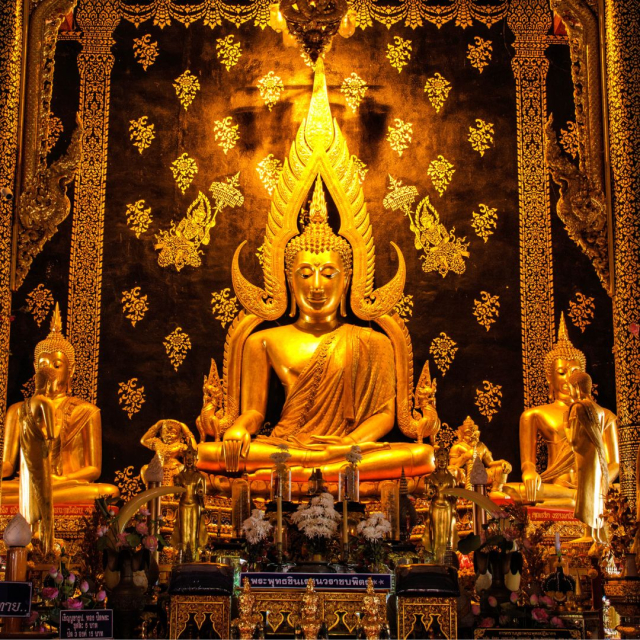Mexico is a country known for its cultural and religious diversity. While Catholicism is the predominant religion, there is a rich variety of non-Catholic religious practices that enrich the social and cultural fabric of the country. Below is a calendar of the most notable non-Catholic religious festivities in Mexico for the year 2024, which covers traditions of various religions such as Judaism, Islam, Buddhism, Hinduism, and indigenous religions.
January
1. New Year (Jewish - Jewish Community)
Date: January 1
Description: Although the Jewish New Year (Rosh Hashanah) is celebrated in the seventh month of the Hebrew calendar, Jewish communities in Mexico also celebrate the Gregorian New Year with family gatherings and synagogue ceremonies.
2. Magha Puja (Buddhist)
Date: January 25
Description: This holiday commemorates the day when 1,250 enlightened disciples gathered to listen to the Buddha's sermon. In Mexico, the Buddhist community celebrates with meditations and teachings in temples and meditation centers.
February
Nirvana Day (Buddhist)
Date: February 15
Description: This holiday celebrates the day when Buddha reached final Nirvana. Buddhists in Mexico commemorate this date with ceremonies of meditation and reflection on the teachings of Buddha.
March
Purim (Jewish)
Date: March 23-24
Description: Purim is a Jewish holiday that celebrates the salvation of the Jewish people in Persia from a plot to exterminate them. Jewish communities in Mexico organize readings of the Book of Esther, costumes, and feasts.
Naw-Rúz (Bahai)
Date: March 20-21
Description: Naw-Rúz is the Bahá'í New Year. It is celebrated with community meetings, prayers, and reflections on the year ahead.
Holi (Hindu)
Date: March 25
Description: Known as the "Festival of Colors", Holi celebrates the arrival of spring and the triumph of good over evil. In Mexico, Hindu communities celebrate with parties full of colors, music and dance.
April
Ramadan (Muslim)
Date: April 10 - May 9
Description: Ramadan is the holy month of fasting in Islam. During this month, Muslims in Mexico fast from dawn to dusk and engage in prayer and reflection.
Vesak (Buddhist)
Date: April 23
Description: Vesak celebrates the birth, enlightenment and death of Buddha. Buddhists in Mexico observe this day with ceremonies and community activities in temples and Buddhist centers.
May
Eid al-Fitr (Muslim)
Date: May 10
Description: It marks the end of Ramadan and is a day of celebration and feasting. Muslim communities in Mexico gather to pray and share festive meals.
Shavuot (Jewish)
Date: May 11-13
Description: Shavuot commemorates the giving of the Torah at Mount Sinai. Jewish communities in Mexico celebrate with Torah readings, prayers, and special meals.
June
Summer Solstice (Indigenous Religions)
Date: June 21
Description: The summer solstice is an important date for many indigenous communities in Mexico, who perform ceremonies and rituals to honor the sun and nature.
July
Eid al-Adha (Muslim)
Date: July 28
Description: This holiday commemorates Abraham's willingness to sacrifice his son in obedience to God. Muslim communities in Mexico celebrate with prayers and the sacrifice of an animal, sharing the meat with those in need.
August
Raksha Bandhan (Hindu)
Date: August 19
Description: This holiday celebrates the bond between brothers and sisters. In Mexico, Hindu communities perform ceremonies where sisters tie a sacred thread on their brothers' wrists as a symbol of protection.
September
Rosh Hashanah (Jewish)
Date: September 2-4
Description: The Jewish New Year is a time of reflection and prayer. Jewish communities in Mexico celebrate with festive dinners, prayers, and the blowing of the shofar.
Yom Kippur (Jewish)
Date: September 11-12
Description: Known as the Day of Atonement, Yom Kippur is the holiest day of the Jewish year. Jews in Mexico observe this day with fasting and prayer.
October
Sukkot (Jewish)
Date: October 16-23
Description: Sukkot celebrates the harvest and remembers the Israelites' stay in the desert. Jewish communities in Mexico build sukkot (huts) and celebrate with food and prayer.
Diwali (Hindu)
Date: October 31
Description: Known as the "Festival of Lights", Diwali celebrates the victory of light over darkness. In Mexico, Hindu communities celebrate with bright decorations, fireworks, and festive banquets.
November
Day of the Dead (Indigenous Religions)
Date: November 1-2
Description: Although widely celebrated by Catholics, Day of the Dead has deep roots in indigenous Mexican traditions. Indigenous communities make offerings and rituals to honor the deceased.
Guru Nanak Gurpurab (Sikh)
Date: November 15
Description: This festival celebrates the birth of Guru Nanak, the founder of Sikhism. Sikhs in Mexico celebrate with scripture readings, songs, and communal meals.
December
Hanukkah (Jewish)
Date: December 25 - January 2
Description: Hanukkah, the "Festival of Lights," commemorates the rededication of the Holy Temple in Jerusalem. Jewish communities in Mexico celebrate by lighting the menorah candles, games, and festive meals.
Winter Solstice (Indigenous Religions)
Date: December 21
Description: The winter solstice is another significant date for indigenous communities, who perform ceremonies to thank Mother Earth and ask for a new cycle of life and harvest.
The religious diversity in Mexico is vast and colorful, reflecting a rich cultural and spiritual heritage. This calendar of non-Catholic religious holidays in 2024 not only highlights the variety of traditions and beliefs that coexist in the country, but also underlines the importance of tolerance and mutual respect between all communities. Celebrating and recognizing these festivities enriches the social fabric of Mexico and promotes greater understanding and appreciation for the diversity that defines this nation.
